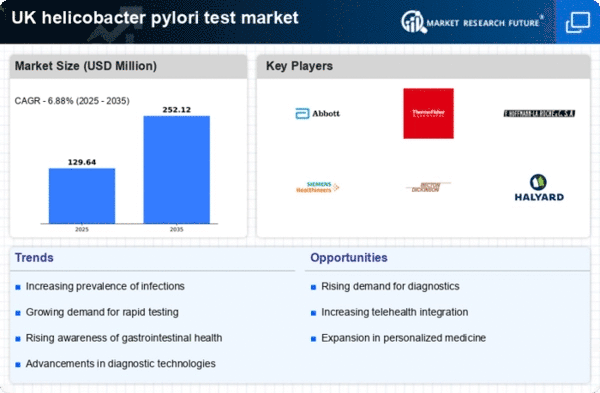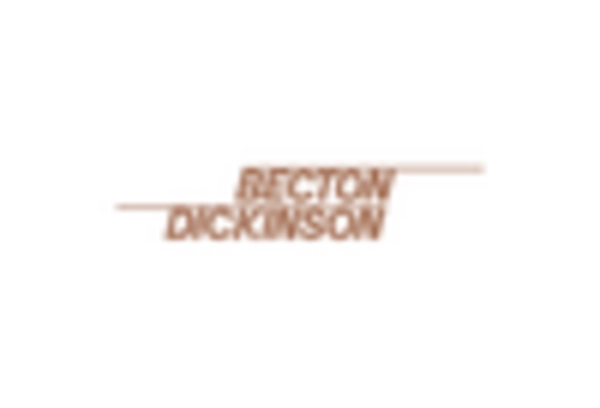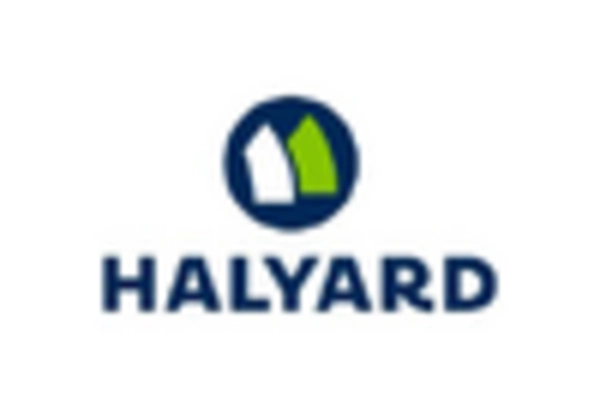Government Initiatives and Funding
Government initiatives aimed at improving healthcare access and disease prevention are significantly influencing the helicobacter pylori-test market. In the UK, public health authorities have been actively promoting screening programs for Helicobacter pylori, particularly in high-risk populations. Funding allocated for research and development of more effective testing methods is also on the rise. For instance, the National Health Service (NHS) has been investing in innovative diagnostic technologies, which could lead to more accurate and faster testing solutions. This financial support not only enhances the availability of testing but also encourages healthcare providers to adopt these new methods, thereby expanding the market. The commitment to improving public health outcomes is likely to sustain growth in the helicobacter pylori-test market.
Rising Demand for Preventive Healthcare
The shift towards preventive healthcare is a notable driver for the helicobacter pylori-test market. In the UK, there is an increasing emphasis on early detection and prevention of diseases, including those associated with Helicobacter pylori infections. Patients and healthcare providers alike are recognizing the value of proactive health measures, which include regular screening and testing. This trend is supported by the growing body of evidence linking Helicobacter pylori to serious health conditions, prompting individuals to seek testing as a preventive measure. The demand for preventive healthcare services is likely to continue rising, thereby positively impacting the helicobacter pylori-test market. As more people prioritize their health, the market is expected to expand in response to this evolving healthcare landscape.
Increased Awareness of Gastrointestinal Health
There is a growing awareness among the UK population regarding gastrointestinal health, which is driving the helicobacter pylori-test market. As individuals become more informed about the symptoms and complications associated with Helicobacter pylori infections, they are more inclined to seek testing. Educational campaigns by healthcare organizations and media outlets have played a crucial role in disseminating information about the importance of early detection. This heightened awareness is reflected in the rising number of consultations with healthcare professionals for gastrointestinal issues. Consequently, the demand for testing services is expected to increase, as patients are more proactive in addressing their health concerns. This trend suggests a positive outlook for the helicobacter pylori-test market as awareness continues to grow.
Technological Innovations in Diagnostic Testing
Technological advancements in diagnostic testing are reshaping the helicobacter pylori-test market. Innovations such as rapid antigen tests, molecular diagnostics, and point-of-care testing are enhancing the accuracy and efficiency of Helicobacter pylori detection. These technologies not only reduce the time required for diagnosis but also improve patient outcomes by facilitating timely treatment. The introduction of non-invasive testing methods, such as breath tests, is particularly appealing to patients, as they offer a more comfortable alternative to traditional endoscopic procedures. As healthcare providers increasingly adopt these advanced technologies, the market is likely to experience significant growth. The ongoing research and development in this field suggest a promising future for the helicobacter pylori-test market.
Rising Incidence of Helicobacter Pylori Infections
The increasing prevalence of Helicobacter pylori infections in the UK is a primary driver for the helicobacter pylori-test market. Recent studies indicate that approximately 30% of the UK population may be infected with this bacterium, which is linked to various gastrointestinal disorders, including peptic ulcers and gastric cancer. As awareness of these health risks grows, healthcare providers are more likely to recommend testing, thereby boosting demand for diagnostic solutions. The rising incidence of related diseases necessitates early detection and treatment, further propelling the market. Additionally, public health campaigns aimed at educating the population about the risks associated with untreated infections are likely to contribute to increased testing rates, thereby enhancing the overall market landscape.
















